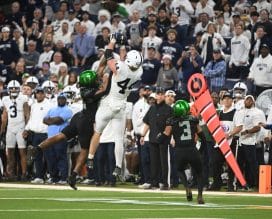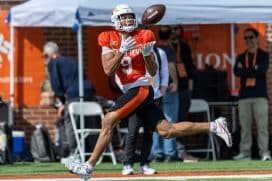Flyers
Flyers 5: Takeaways from Game 6 of Flyers-Islanders
By Kevin Durso, Sports Talk Philly editor
From the beginning of the game, the Flyers were going to have to reach deep down to find it in them to win this game. A key player was out of the lineup. An inspirational one was in.
There were times when the Flyers looked poised to win this game. There were times when the Islanders looked like they had assumed control. There were times when it looked like the Flyers weren’t desperate enough.
In a wild, back-and-forth tilt, both teams showed the qualities and identity that they have established. This series has been as hard-fought as they come. Neither team quits. Ever. And it showed in Game 6 as both sides assumed control at different points and as the game drug on into the night.
It took well beyond the 60 minutes required to get the job done. By the time the game ended, it was late in the second overtime. But somehow, there will be a Game 7. After trailing in the series, 3-1, a 5-4 double-overtime win has brought the Flyers back even in the series with one game in front of them against the Islanders. All that’s on the line is a trip to the Eastern Conference Finals.
Here are 5 takeaways from Game 6.
1. Hart Stopping
How can you not start with the Flyers netminder?
Here’s a brief synopsis of Carter Hart’s night: In the opening period, the Islanders had 10 shots on goal. In the second, they peppered him with 18 shots. In the third, another 14 came his way. In the first overtime, add another nine to the total. And even though he faced just two shots in the second overtime, he started to give that vibe that it wasn’t going to be some fluky goal or weak shot through his arm that won the game, it would take the perfect play.
Hart was simply outstanding and has proven to be the catalyst here. You can take anybody out of the lineup and throw anybody in. It really doesn’t matter. As long as Hart is in goal, the Flyers sure seem to have a chance.
This was Carter Hart’s finest. In total, he made 49 saves on 53 shots. Perhaps more importantly than that, after allowing a goal on the final shot the Islanders had in the second period, one that gave them a 4-3 lead, he stopped all 25 shots that came his way following that, through a crucial third period and two overtimes.
It ended up being the third longest game in Flyers history, coming in behind Keith Primeau’s five-overtime spectacular in 2000 and Mark Recchi’s heroics in the third overtime in 2003. Hart moves into fifth in Flyers history with his 49-save performance, falling behind two performances by Bernie Parent (63 saves on April 16, 1968 and 54 saves on April 10, 1968), Brian Boucher (57 saves on May 4, 2000) and Robert Esche (55 saves on April 22, 2006).
Finally, the Flyers have the goalie with the poise, the determination, the mentality, the ability to overcome adversity within the game that gives this team a chance. It takes a team to continually win playoff series, but you really need to have that reassurance behind you in goal to make it happen. The Flyers have it in Carter Hart.
2. Going the Distance
In order to force a Game 7, the Flyers needed to play an extra 35:03 to make it happen. Leave it to the player that almost always sees the ice the most to score the deciding goal.
Ivan Provorov finished the game with 38:15 of ice time, the last little bit coming as he scored the game-winning goal at 15:03 of the second overtime. This is just the fifth game in Flyers history since ice time started tracking in the 1997-98 season where a player passed the 38-minute mark in ice time. Provorov is the 16th player to do so in franchise history, with multiple players reaching that mark in the five-overtime game in 2000.
Provorov was his usual self, a defensive stud on the blue line. He was a plus-3 in the game. He had four hits. He blocked two shots. He played 6:40 of his 38 minutes on the penalty kill. And on his second shot of the game, he found the net and lifted the Flyers to victory.
The game-winning goal is a heads-up play on all fronts. Scott Mayfield breaks his stick, and as Kevin Hayes moves back in transition, he looks to the Islanders bench to potentially retrieve a new stick. He is unable to do so, and that allows Hayes to attack him. He moves in and spins a pass through the slot that won’t connect if Mayfield has a stick. But without one, Hayes’ pass goes right up the middle to Provorov, who lets go a shot that gets through the traffic, grazes the stick of Semyon Varlamov and goes off the top bar and in.
Leave it to the Flyers defenseman who is such a warrior on the ice to get the job done in crunch time when the opportunity arose in the closing stages of the second overtime.
3. A Wild 40 Minutes
As for the rest of the game leading up to overtime, what a wild 40 minutes to get it all started.
From the beginning, the Islanders were the team that dominated in shot volume. They had 10 shots in an opening period that, on the scoreboard, was led by the Flyers.
Both goals in the first period were the result of Islanders turnovers where the Flyers capitalized. Hayes got the puck in the slot after a give-and-go with Travis Konecny that was all started when Robert Hagg stole the puck in the neutral zone. James van Riemsdyk scored with a slap shot off the rush after the Islanders were caught with four men in the offensive zone.
The Islanders got one answer late in the first period shortly after a power play on a goal that was the result of still being in power-play formation. A tip in the slot by Derick Brassard off the set-up from Devon Toews came before Nicolas Aube-Kubel could return to the play.
That was a turning point. After Aube-Kubel’s penalty and Brassard’s goal, the Islanders dominated from there. It carried early into the second period, when Matt Martin scored off a counterrush that started when Justin Braun’s point shot was blocked at 1:24. The Flyers then challenged that goal, a poor challenge on Alain Vigneault’s part, and paid the price when Anders Lee scored on a rebound off a Mathew Barzal chance to take a 3-2 lead.
But the Flyers were resilient and stayed the course, eventually getting the tying goal off a set-up by Aube-Kubel where his distance shot left a rebound for Michael Raffl. That goal came with 6:39 left in the second, and the Flyers were under a minute away from going to the third in a 3-3 game.
That’s when Travis Sanheim picked the worst time to be burned by a turnover. Sanheim wasn’t quick to make a decision with the puck, and Brassard picked his pocket behind the net. Brassard got the puck to Barzal and the budding young forward with superstar potential showed it, firing a shot high over Hart to make it a 4-3 game.
If Game 3 was any indication, a goal that late in the period is a backbreaker and the Flyers may not be able to recover. But shortly after an Islanders power play in the third, the Flyers took advantage of a mishandle at the blue line and got a breakaway from Scott Laughton that resulted in the tying goal. That was another turning point that brought the game back even, and set the stage for a grueling 35 minutes of overtime.
4. Oskar Strong
Now for the source of inspiration. The Flyers were without Sean Couturier and Joel Farabee in the game, and certainly playing without two forwards who have been a regular part of your top six is a challenge. Playing without your top-line center is incredibly difficult.
But when you can sub in a true inspiration like Oskar Lindblom, it can make a huge difference.
I have to imagine that Lindblom’s presence on the bench in overtime kept the rest of his teammates going and pushing forward, not only given the fight he had been through, but to keep playing for him.
Lindblom did not factor into the scoring in his first game back, but that’s something that may have to come with time and experience. He did play 17:30 and record two hits and a blocked shot with three shot attempts. It’s more than enough in his debut, especially when he is less than nine months removed from a diagnosis with Ewing’s sarcoma.
5. Winner Take All
The stage is set for Saturday and what a series this has been. Both of these teams have shown great resolve and determination. Both of these teams deserve the opportunity to play in the conference finals. It’s really a shame that someone’s bubble will burst on Saturday night.
That said, this is the type of series that playoff hockey is all about. It should be quite the game. It will be quite the finish to the series. And when it’s over, it will be quite the handshake line.
For the Flyers, this is their opportunity to advance to the conference finals for the first time since 2010. It has taken three overtime wins to get to this point, the first time in franchise history that they have won three games in overtime in a single playoff series.
For the Islanders, the same chance awaits, and it’s a much longer drought since their last conference finals appearance.
Everything will be on the line, and there’s no doubt both teams will be leaving it all on the ice.





